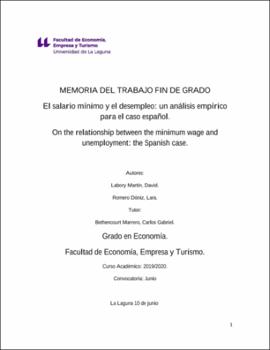El salario mínimo y el desempleo: un análisis empírico para el caso español
Date
2020Abstract
El objetivo de este trabajo es analizar la relación entre el salario mínimo y el desempleo en España,
y su evolución temporal entre 1978 y 2019. Para ello se realiza primero un análisis descriptivo en el
que encontramos que existe una correlación muy baja entre el salario mínimo y la tasa de paro.
Además, esta relación no cambia sustancialmente cuando controlamos por el sexo, la edad, tipo de
actividad y región de los trabajadores. Para el subperiodo 2008-2017, por el contrario, se observa
una clara relación negativa entre estas variables. Seguidamente, se estima un panel para explicar la
tasa de paro por regiones entre 2000-2018. Los resultados muestran que el salario mínimo tiene un
fuerte efecto negativo en la tasa de paro y que el PIB per cápita es la variable explicativa más
significativa. Finalmente, se comprueba que estos resultados son robustos a varias especificaciones
del modelo y varios controles The objective of this project is studying the relationship between the minimum wage and the
unemployment rate in Spain between 1978 and 2019.We first describe the behaviour of these
variables along time and we document a low correlation between the minimum wage and the
unemployment rate. Moreover, this result does not change too much when we control by variables
such as sex, age, type of economic activity and region. However, in the post-economic crisis period
(2008-2017) we observe this relationship turns to be strongly negative. Next, we estimate a panel
data to explain the unemployment rate by regions from 2000 to 2018. Main results are that the
minimum wage has an important negative effect on the unemployment rate and per capita GDP is the
most significant explanatory variable. Finally, we propose several alternative specifications of the
model and we confirm that our results are robust to all of them.





